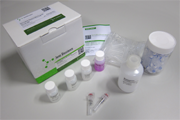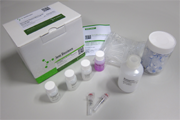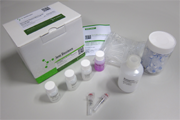SCRIPT Reverse Transcriptase (20.000 units)
Detailní popis
For in vitro use only!
Unit Definition: One unit is defined as the amount of enzyme required to catalyze the incorporation of 1 nmol of dTTP into an acid-insoluble form in 10 minutes at 37 °C.
Shipping: shipped on blue ice
Storage Conditions: store at -20 °C
avoid freeze/thaw cycles
Shelf Life: 12 months
Purity: free of endo- and exodeoxyribonucleases, phosphatases and ribonuclease
Form: liquid
Concentration: 200 units/μl
Activity: Activity and stability tested in first strand cDNA synthesis.
Applications:
Extremely sensitive and highly specific RT-PCR, synthesis of highly structured and long cDNA fragments, DNA labelling.
Description:
SCRIPT Reverse Transcriptase is a genetically engineered version of M-MLV Reverse Transcriptase (M-MLV RT) with eliminated RNase H activity and increased thermal stability. The enzyme is a RNA-directed DNA polymerase that synthesizes a complementary DNA strand initiating from a primer using single-stranded RNA or DNA as template. Its enhanced thermal stability in combination with the deactivated RNase H activity results in an increased specificity, higher cDNA yield and an improved efficiency for full length cDNA synthesis compared with standard M-MLV RT. The enzyme is recommended for synthesis of cDNA from 100 bp up to 10 kb length.
Content:
SCRIPT Reverse Transcriptase (red cap)
200 units/μl in 50 mM Tris-HCl, 100 mM NaCl, 1 mM EDTA,
5 mM DTT, 0.1 % NP-40, 50 % glycerol (v/v), pH 8.0 (25°C)
5x SCRIPT RT Buffer complete (green cap)
250 mM Tris-HCl (pH 8.3), 500 mM KCl, 30 mM MgCl2, 25 mM DTT
dNTP Mix (white cap)
10 mM each dNTP (dATP, dCTP, dGTP, dTTP)
DTT stock solution (purple cap)
100 mM DTT
Recommended protocols for cDNA synthesis:
Sample denaturation is particularly recommended for RNA targets that exhibit a high degree of secondary structure, for self- or cross-complementary primers and for initial experiments with new targets. For many standard combinations of RNA and primers heat treatment may be omitted with no negative effect on results.
1a Assay set-up without sample denaturation
(standard RNA/primer combinations)
Assay preparation
Add the following components to a nuclease-free microtube. Pipett on ice and mix the components by pipetting gently up and down. In general, water, RNA and primers should be mixed together before the remaining components are added.
| component | stock conc. | final conc. | 20 μl assay |
| RNase-free water | - | - | fill up to 20 μl |
| RNA template | - | total RNA: 10 pg - 5 μg or mRNA: 10pg-500ng |
x μl |
| Primer | 10 μM | -gene-specific primer: 10-20 pmol (50-100 ng) -oligo-dT15-25 primer: 50 pmol (300 ng) -random primer: 50 pmol (100 ng) |
- 1-2 μl - 5 μl - 5 μl |
| SCRIPT RT Buffer complete |
5x | 1x | 4 μl |
| dNTP Mix | 10 mM each | 500 μM each |
1 μl |
| DTT stock solution1) |
100 mM | 5 mM | 1 μl |
| RNase Inhibitor2) | 40 units/μl | 20 units | 0,5 μl |
| SCRIPT Reverse Transcriptase3) | 200 units/μl | 100-200 units | 0.5-1 μl |
1)Adding of up to 5 mM DTT may increase the yield and is recommended for individual optimization.
2)Addition of 20-40 units RNase inhibitor per assay is recommended and may be essential when working with low amounts of starting RNA.
3)100 units (0.5 μl) of enzyme is recommended for standard assays but increasing the amount of enzyme to 200 units (1 μl) per assay may show even higher transcription yields under selected assay conditions.
1b Assay set-up with sample denaturation
(RNA/primer with a high degree of secondary structure)
Preparation of the RNA Template / Primer Mix
Add the following components to a nuclease-free microtube and mix by pipetting gently up and down:
| component | stock conc. | final conc. | 20 μl assay |
| RNase-free water | - | - | fill up to 10 μl |
| RNA template | - | total RNA: 10 pg - 5 μg or mRNA: 10pg-500ng |
x μl |
| Primer | 10 μM | -gene-specific primer: 10-20 pmol (50-100 ng) -oligo-dT15-25 primer: 50 pmol (300 ng) -random primer: 50 pmol (100 ng) |
- 1-2 μl - 5 μl - 5 μl |
Denaturation and primer annealing
Incubate the mixture at 65-70 °C for 5 min and place it at room temperature (if using specific primer) or on ice (if using oligo-dT or random primer).
Preparation of the Reaction Mix
Add the following components to a further nuclease-free microtube and mix by pipetting gently up and down:
| component | stock conc. | final conc. | 20 μl assay |
| RNase-free water | - | - | fill up to 10 μl |
| SCRIPT RT Buffer complete |
5x | 1x | 4 μl |
| dNTP Mix | 10 mM each | 500 μM each |
1 μl |
| DTT stock solution1) |
100 mM | 5 mM | 1 μl |
| RNase Inhibitor2) | 40 units/μl | 40 units | 1 μl |
| SCRIPT Reverse Transcriptase3) | 200 units/μl | 100-200 units | 0.5-1 μl |
1)Adding of up to 5 mM DTT may increase the yield and is recommended for individual optimization.
2)Addition of 20-40 units RNase inhibitor per assay is recommended and may be essential when working with low amounts of starting RNA.
3)100 units (0.5 μl) of enzyme is recommended for standard assays but increasing the amount of enzyme to 200 units (1 μl) per assay may show even higher transcription yields under selected assay conditions.
Complete Reaction Mix
Add 10 μl Reaction Mix to 10 μl RNA Template / Primer Mix to complete the 20 μl Reaction Mix. Pipett on ice and mix by pipetting gently up and down.
2 First-strand cDNA synthesis
Incubation
Incubate the reaction mix at 50 °C for 30-60 min if using gene-specific primers. If using oligo-dT or random primers incubate at 42 °C for
10 min followed by incubation at 50 °C for 30-60 min.
[Please note: The optimal time depends on the length of cDNA. Incubation of 60 min is recommended for cDNA fragments of more than 2,000 bp length. The optimal temperature depends on the structural features of the RNA. Increase the temperature to 55 °C for difficult templates with high secondary structure. Note that optimal reaction time and temperature should be adjusted for each particular RNA.]
Optional: Heat inactivation
Heat the mixture to 70 °C for 10 min to inactivate the Reverse Transcriptase.
Optional: RNA removal
Add 2 units DNase-free RNase and incubate at 37 °C for 20 min.
The cDNA can now be used as template in PCR or be stored at -20 °C. Apply 2-5 μl of the RT assay for further amplification in PCR.
However, some specific DNA applications may require the prior inactivation of the remaining RTase or the enzymatic removal of RNA.
Product Citations:
Please click the black arrow on the right to expand the citation list. Click publication title for the full text.
Availability Restriction: Exclusively distributed in Japan by Greiner BioOne
Customers also purchased:
Hodnocení produktu
Produkt zatím nikdo nehodnotil, buďte první!



